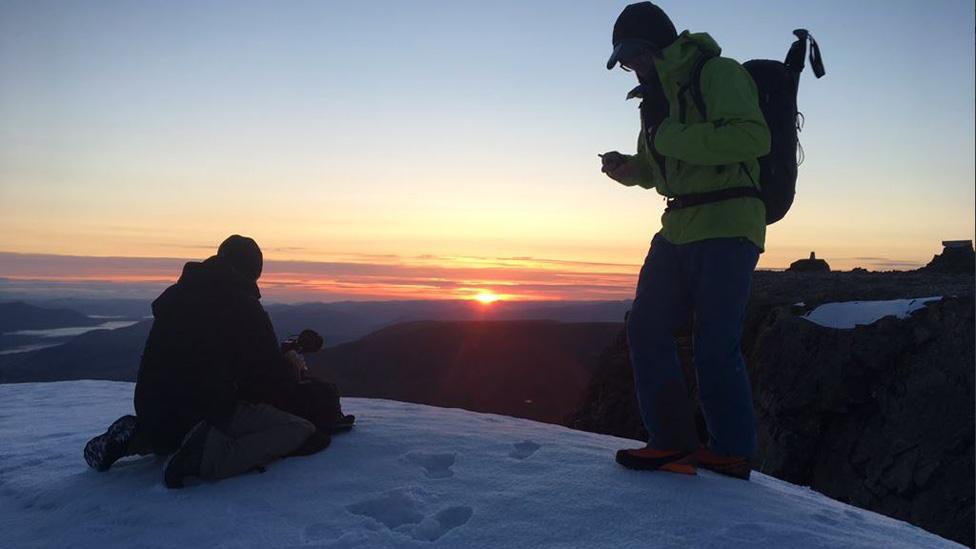Being at work on a beautiful but dangerous Ben Nevis
- Published

It is the last Wednesday in May and a ǵüµÇ¨û§ news crew prepare for a day's work on Britain's highest mountain - Ben Nevis.
The group is just one of many which will climb the peak 4,413ft (1,345m) in the summer months ahead.
Over the last decade the number of people ascending this Highlands mountain has doubled to 160,000 per year.
Its growing popularity has created challenges for the maintenance of Ben Nevis - and for those whose role is to keep people safe on Scotland's hills.
ǵüµÇ¨û§ Scotland correspondent James Shaw and his colleagues set off at midnight for the climb to the summit, before broadcasting live.
The news team set off at midnight to reach their live broadcast point at the top of the mountain
For the ǵüµÇ¨û§'s James Shaw, the top of a mountain was an unusual rendezvous point for a TV news interview
They used torches to make the arduous five-hour journey, accompanied by experienced guide Mike Pescod.
Proper planning is vital to minimise the dangers in an environment where conditions can change quickly.
Annually, tens of thousands of people take up the challenge to climb Ben Nevis
Being prepared - ice axe, helmet, appropriate footwear and clothing - is the obvious but necessary advice
It's also important to keep assessing the risks throughout your journey.
And the advice from experienced climbers is that you should always have alternative plans - and be prepared to turn back if the conditions aren't right.
The reward for those who attempt the ascent are amazing views.
On a clear day you can see many miles - and it was a clear day for the ǵüµÇ¨û§ film crew
How a ǵüµÇ¨û§ correspondent climbed Ben Nevis in the dark to get on air
The climb was about five hours long, but the stunning view would be worth it
However, the increasing interest in conquering Britain's highest peak does have an impact.
The trails have just undergone a ôÈ900,000 revamp to make them more durable.
For some, the shelter on top of Ben Nevis is a welcome, wind free, resting place
The well-worn Ben Nevis path has to be maintained for the thousands who trek along it
And more people also means more accidents, which puts more pressure on the mountain rescue teams in the area.
Those risks have been highlighted by a number of fatalities on Ben Nevis over the winter, including the deaths of three climbers from France and Switzerland in an avalanche in March.
Pictures by ǵüµÇ¨û§ news crew. Correspondent James Shaw broadcast live from Ben Nevis on ǵüµÇ¨û§ Breakfast.
- Published30 May 2019